 Harriet Tubman Day is an American holiday in honor of the anti-slavery activist Harriet Tubman, observed on March 10, and in the U.S. state of New York. Observances also occur locally around the U.S. state of Maryland. After Juneteenth became a federal holiday, there are growing calls for this day to also be observed at the federal level. Harriet Tubman, born Araminta Ross (c. 1822 – March 10, 1913) was an American abolitionist, humanitarian, and an armed scout and spy for the United States Army during the American Civil War. Born into slavery, Tubman escaped and subsequently made thirteen missions to rescue seventy enslaved families and friends, using the network of antislavery activists and safe houses known as the Underground Railroad. She later helped abolitionist John Brown to recruit men for his raid on the Harpers Ferry. Tubman was also an active participant in the struggle for women’s suffrage. On April 20, 2016, then-U.S. Treasury Secretary Jack Lew announced plans to add a portrait of Tubman to the front of the twenty-dollar bill, moving the portrait of President Andrew Jackson, himself an enslaver and trafficker of human beings, to the rear of the bill. Lew instructed the Bureau of Engraving and Printing to expedite the redesign process, and the new bill was expected to enter circulation sometime after 2020. However, in 2017 U.S. Treasury Secretary Steven Mnuchin said that he would not commit to putting Tubman on the twenty-dollar bill, saying, “People have been on the bills for a long period of time. This is something we’ll consider; right now, we have a lot more important issues to focus on.” In 2021, under the Biden administration, the Treasury Department resumed the effort to add Tubman’s portrait to the front of the $20 bill and hoped to expedite the process. And now on to this week’s logistics news.
Harriet Tubman Day is an American holiday in honor of the anti-slavery activist Harriet Tubman, observed on March 10, and in the U.S. state of New York. Observances also occur locally around the U.S. state of Maryland. After Juneteenth became a federal holiday, there are growing calls for this day to also be observed at the federal level. Harriet Tubman, born Araminta Ross (c. 1822 – March 10, 1913) was an American abolitionist, humanitarian, and an armed scout and spy for the United States Army during the American Civil War. Born into slavery, Tubman escaped and subsequently made thirteen missions to rescue seventy enslaved families and friends, using the network of antislavery activists and safe houses known as the Underground Railroad. She later helped abolitionist John Brown to recruit men for his raid on the Harpers Ferry. Tubman was also an active participant in the struggle for women’s suffrage. On April 20, 2016, then-U.S. Treasury Secretary Jack Lew announced plans to add a portrait of Tubman to the front of the twenty-dollar bill, moving the portrait of President Andrew Jackson, himself an enslaver and trafficker of human beings, to the rear of the bill. Lew instructed the Bureau of Engraving and Printing to expedite the redesign process, and the new bill was expected to enter circulation sometime after 2020. However, in 2017 U.S. Treasury Secretary Steven Mnuchin said that he would not commit to putting Tubman on the twenty-dollar bill, saying, “People have been on the bills for a long period of time. This is something we’ll consider; right now, we have a lot more important issues to focus on.” In 2021, under the Biden administration, the Treasury Department resumed the effort to add Tubman’s portrait to the front of the $20 bill and hoped to expedite the process. And now on to this week’s logistics news.
- Global supply chains back to normal
- Supply chain issues will make Girl Scout Cookies harder to find
- Albuterol shortage is about to worsen in USA
- California is racing to electrify trucks
- Honda’s latest autonomous robot is designed to move things around construction sites
- US Foods tries weekend deliveries
- Grocers go all in on hunger relief
- Upway launches online marketplace for refurbished e-bikes in US
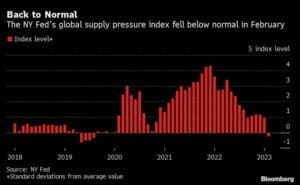 As I pointed out earlier this week, according to the Federal Reserve Bank of New York, nearly three years after Covid-19 was declared a pandemic, supply chains are back to normal. Actually, when looking a bit closer at the numbers, supply pressures actually fell below normal. Zero marks the historical average, and changes in either direction mark standard deviations from that trend. The February reading in the New York Fed’s Global Supply Chain Pressure Index was -0.26, reaching negative territory for the first time since August 2019. Maximum disruptions pushed the gauge to a peak of 4.31 in December 2021. The gauge brings together 27 variables that take the temperature of everything from cross-border transportation costs to country-level manufacturing data in the euro area, China, Japan, South Korea, Taiwan, the U.K. and the U.S.
As I pointed out earlier this week, according to the Federal Reserve Bank of New York, nearly three years after Covid-19 was declared a pandemic, supply chains are back to normal. Actually, when looking a bit closer at the numbers, supply pressures actually fell below normal. Zero marks the historical average, and changes in either direction mark standard deviations from that trend. The February reading in the New York Fed’s Global Supply Chain Pressure Index was -0.26, reaching negative territory for the first time since August 2019. Maximum disruptions pushed the gauge to a peak of 4.31 in December 2021. The gauge brings together 27 variables that take the temperature of everything from cross-border transportation costs to country-level manufacturing data in the euro area, China, Japan, South Korea, Taiwan, the U.K. and the U.S.
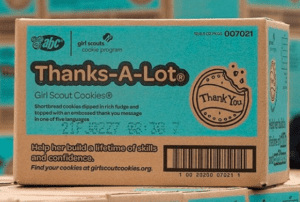 However, as I pointed out in the aforementioned article, supply chain shortages are still something that consumers are dealing with. Girl Scout Cookie season is upon us, and supply chain shortages could make it more challenging to get your favorite cookie. Little Brown Bakers, the manufacturer behind Girl Scout Cookies, is warning of unforeseen supply issues that will be impacting both manufacturing and distribution of its treats. While the company did not go into more detail on the matter, it should be noted that the Girl Scouts of America are rolling out an online ordering system to boost sales this year. Little Brown Bakers has said that digital orders could take longer than normal to fulfill due to unforeseen supply chain shortages. However, the Girl Scouts have said that in-person distribution of cookies will not be impacted by the supply chain issues.
However, as I pointed out in the aforementioned article, supply chain shortages are still something that consumers are dealing with. Girl Scout Cookie season is upon us, and supply chain shortages could make it more challenging to get your favorite cookie. Little Brown Bakers, the manufacturer behind Girl Scout Cookies, is warning of unforeseen supply issues that will be impacting both manufacturing and distribution of its treats. While the company did not go into more detail on the matter, it should be noted that the Girl Scouts of America are rolling out an online ordering system to boost sales this year. Little Brown Bakers has said that digital orders could take longer than normal to fulfill due to unforeseen supply chain shortages. However, the Girl Scouts have said that in-person distribution of cookies will not be impacted by the supply chain issues.
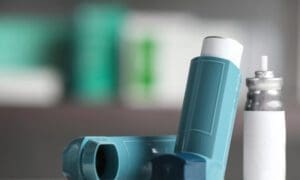 There are also more serious implications of supply chain shortages than not getting the cookies that we want. Albuterol, a drug used to treat patients with breathing problems, is currently in short supply in the United States, sparking concern that doctors may have to limit its use. The American Society of Health-System Pharmacists confirmed that liquid albuterol has been in short supply since the summer of 2022 and the drug has been on the FDA’s shortages list since October. The situation has worsened after a major supplier was shut down in the US, likely exacerbating the shortage. Akorn Operating Company filed for bankruptcy in 2020 but had continued to manufacture albuterol until last fall. It was the only US company which produced albuterol products for continuous nebulizer treatment, which is common in children’s hospitals.
There are also more serious implications of supply chain shortages than not getting the cookies that we want. Albuterol, a drug used to treat patients with breathing problems, is currently in short supply in the United States, sparking concern that doctors may have to limit its use. The American Society of Health-System Pharmacists confirmed that liquid albuterol has been in short supply since the summer of 2022 and the drug has been on the FDA’s shortages list since October. The situation has worsened after a major supplier was shut down in the US, likely exacerbating the shortage. Akorn Operating Company filed for bankruptcy in 2020 but had continued to manufacture albuterol until last fall. It was the only US company which produced albuterol products for continuous nebulizer treatment, which is common in children’s hospitals.
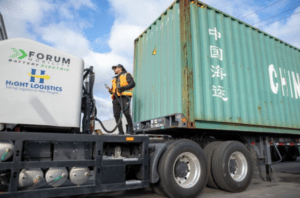 While the Biden administration hopes to see zero-emission trucks make up 30 percent of big rig sales by 2030, California has more ambitious plans. It wants to make all trucks used for drayage zero-emissions within 12 years, and medium and heavy-duty vehicles of all kinds zero-emission “where feasible” by 2045. Massachusetts, New York, New Jersey, and Oregon also are moving to decarbonize drayage. No regulation will put more pressure on companies than California’s Advanced Clean Fleets Rule. It would require that, beginning next year, all newly registered drayage trucks be zero emission. It also mandates that, beginning in 2025, any rigs with an engine 13 years or older be replaced with a zero-emissions truck once it hits 800,000 miles. The California Air Resources Board is expected to approve the rule in April. The accelerated decarbonization timeline for drayage is an acknowledgement of the logistical challenges of electrifying long-haul trucks.
While the Biden administration hopes to see zero-emission trucks make up 30 percent of big rig sales by 2030, California has more ambitious plans. It wants to make all trucks used for drayage zero-emissions within 12 years, and medium and heavy-duty vehicles of all kinds zero-emission “where feasible” by 2045. Massachusetts, New York, New Jersey, and Oregon also are moving to decarbonize drayage. No regulation will put more pressure on companies than California’s Advanced Clean Fleets Rule. It would require that, beginning next year, all newly registered drayage trucks be zero emission. It also mandates that, beginning in 2025, any rigs with an engine 13 years or older be replaced with a zero-emissions truck once it hits 800,000 miles. The California Air Resources Board is expected to approve the rule in April. The accelerated decarbonization timeline for drayage is an acknowledgement of the logistical challenges of electrifying long-haul trucks.
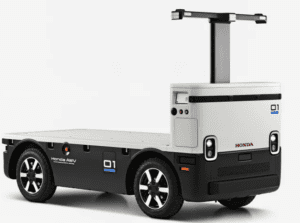 Honda is known for both vehicles and robots, and over the last few years it has tried combining those two things with the Autonomous Work Vehicle (AWV). It just unveiled a new 3rd-generation version designed to transport up to two pallets worth of goods around worksites with no human assistance. The AWV has evolved from what was basically an ATV with the top chopped off, to a glorified autonomous electric wagon to the current model. Compared to the 2nd-generation version, the latest AWV has a larger bed size (two pallets) and higher capacity (2,000 pounds); a higher self-driving speed of up to 10 MPH; a larger battery that offers up to 10 hours and 28 miles of endurance; better avoidance functions; and a lower bed for easier loading.
Honda is known for both vehicles and robots, and over the last few years it has tried combining those two things with the Autonomous Work Vehicle (AWV). It just unveiled a new 3rd-generation version designed to transport up to two pallets worth of goods around worksites with no human assistance. The AWV has evolved from what was basically an ATV with the top chopped off, to a glorified autonomous electric wagon to the current model. Compared to the 2nd-generation version, the latest AWV has a larger bed size (two pallets) and higher capacity (2,000 pounds); a higher self-driving speed of up to 10 MPH; a larger battery that offers up to 10 hours and 28 miles of endurance; better avoidance functions; and a lower bed for easier loading.
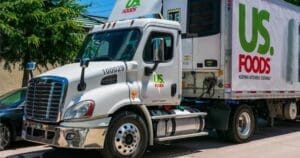 Foodservice distributor US Foods is adding Saturday and Sunday deliveries in a handful of test markets as a potential plus for employees and customers. The three-market trial is intended to provide workers with more scheduling flexibility. The pilot program allows employees to opt for three, four or five-day workweeks across a seven-day stretch, weekends included. Like many operators, distributors have been struggling to restaff to pre-pandemic levels. Truck drivers have proven particularly difficult to recruit and retain. US Foods has discovered that some foodservice customers have also embraced the option of being restocked on Saturdays and Sundays, in part because they typically schedule more staff for weekend shifts. The chances of someone being available to check in the new supplies are greater.
Foodservice distributor US Foods is adding Saturday and Sunday deliveries in a handful of test markets as a potential plus for employees and customers. The three-market trial is intended to provide workers with more scheduling flexibility. The pilot program allows employees to opt for three, four or five-day workweeks across a seven-day stretch, weekends included. Like many operators, distributors have been struggling to restaff to pre-pandemic levels. Truck drivers have proven particularly difficult to recruit and retain. US Foods has discovered that some foodservice customers have also embraced the option of being restocked on Saturdays and Sundays, in part because they typically schedule more staff for weekend shifts. The chances of someone being available to check in the new supplies are greater.
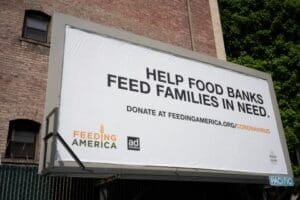 Food retailers across the country are kicking off initiatives to help communities combat hunger. Customer-led donations punctuated support from both The Giant Co. and The Save Mart Cos., while Hy-Vee, Inc. is undertaking a new initiative. Hy-Vee’s newest hunger-fighting campaign aims to provide 100 million meals to Feeding America and 18 partner food banks across its eight-state footprint in the Midwest. In addition to customer donations at the register, national food manufacturers and suppliers will help provide food and funds to benefit the food banks. For its part, Save Mart and its banners are donating 166,000 pounds of healthy, shelf-stable items, equaling nearly 139,000 meals, to their local community food banks throughout California and Northern Nevada.
Food retailers across the country are kicking off initiatives to help communities combat hunger. Customer-led donations punctuated support from both The Giant Co. and The Save Mart Cos., while Hy-Vee, Inc. is undertaking a new initiative. Hy-Vee’s newest hunger-fighting campaign aims to provide 100 million meals to Feeding America and 18 partner food banks across its eight-state footprint in the Midwest. In addition to customer donations at the register, national food manufacturers and suppliers will help provide food and funds to benefit the food banks. For its part, Save Mart and its banners are donating 166,000 pounds of healthy, shelf-stable items, equaling nearly 139,000 meals, to their local community food banks throughout California and Northern Nevada.
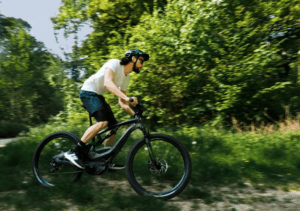 Upway, the French startup that refurbishes and resells electric bikes across a range of brands, launched in the U.S. Tuesday. The company will focus its efforts on the Northeast region of the country, but its bikes will be available for shipping across the continental U.S. Upway has already made a name for itself in Europe, where it has refurbished and certified more than 10,000 e-bikes throughout France, Belgium, Germany and the Netherlands since its launch in 2021. With the rise of e-bike sales in the U.S. that kicked off during the COVID-19 pandemic, a secondhand market is beginning to emerge. It’s not enough, however, to just buy a used e-bike on Craigslist or Facebook Marketplace — customers want to know that they’re getting not just an affordable product, but also a safe one, particularly as the rate of fires caused by e-bike batteries increases.
Upway, the French startup that refurbishes and resells electric bikes across a range of brands, launched in the U.S. Tuesday. The company will focus its efforts on the Northeast region of the country, but its bikes will be available for shipping across the continental U.S. Upway has already made a name for itself in Europe, where it has refurbished and certified more than 10,000 e-bikes throughout France, Belgium, Germany and the Netherlands since its launch in 2021. With the rise of e-bike sales in the U.S. that kicked off during the COVID-19 pandemic, a secondhand market is beginning to emerge. It’s not enough, however, to just buy a used e-bike on Craigslist or Facebook Marketplace — customers want to know that they’re getting not just an affordable product, but also a safe one, particularly as the rate of fires caused by e-bike batteries increases.
That’s all for this week. Enjoy the weekend and the song of the week, Stand Up (from Harriet) by Cynthia Erivo.

















